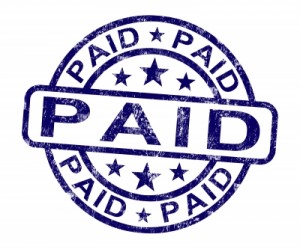Budgeting money on a low income is hard, but it can be done. I have been living on a low income now for eight years and these are a list of my tips that I have found invaluable for keeping me on track with my budgeting. Yes there are weeks where I have no money left after everything has been paid, however I can live in comfort knowing that we have a roof over our head and food in our bellies and know that we aren’t doing too bad. Here are the tips I have used to help me manage my money:
- If you are on a Centrelink payment utilise Centrepay, their free payment service. You can use it for a variety of services such as electricity or phones. There is a number of companies that allow you to utilise this service. It works by you requesting Centrelink, either online or over the phone, to take a set amount from your payment each fortnight to pay towards your bill. I utilise this for paying my electricity bill which usually comes in in credit. I can adjust the payments myself online to either increase or decrease depending on how my bill shapes up.
- Pay as many bills fortnightly as you possibly can. I find it is so much better to pay a small amount fortnightly as it takes away the temptation to spend that money. I pay my rates, water, phone, and internet by direct debit each fortnight by just using the usual Bpay details on the previous bill. When I had a postpaid mobile phone I did the same but now I’m on prepaid I just put half the payment away each fortnight ready for when it comes due.

Image courtesy of Stuart Miles/freedigitalphotos.net
- If at all possible pay your house, contents, car, or health insurance yearly as companies put a surcharge on for paying by the month, although not all do this. To do this you need to be disciplined and ensure that you are putting the money away so that when they come in you have the money, if you don’t think you can be that disciplined you are better to pay monthly.
- Queensland Transport has a payment card for you to pay your registration off throughout the year. You apply through Australia Post and once you get your card you take it into Australia Post with a minimum of $40 for each payment. I put away $20 per fortnight and then every second fortnight I go in and put it on my card. Then when my registration bill comes in I usually have only have a small amount to pay, if any. I’m sure other states would have similar arrangements for paying their registration.
- Shop around – it always pays to compare you insurances, internet service, electricity etc. at least annually. There are so many comparison sites available now it is easy to quickly see if you can make any savings on your bills.
- Set up some online savings accounts. I like ING as you can have a number of savings accounts that you can create a nickname for. I have ones for Gifts, Education Expenses, General Budgeting Expenses, and Holidays.
- Set up coin saving jars where you throw coins left over at the end of the day. We have a 5c/10c jar. A 20c jar – this is specifically using the showers when camping. And a 50c plus jar – this jar also ends up with left over gold coins or notes at the end of the fortnight. When the 5c/10c jar and 50c plus jars are full I deposit them into my mortgage but you could use it for any purpose – putting into your emergency savings account, saving for a holiday (we’ve done this in the past), buying a new computer, going to the zoo – the options are endless. It’s amazing how quickly coins accumulate!

Image courtesy of AKARAKINGDOMS/freedigitalphotos.net
- Set up accounts or envelopes to put the money in each fortnight for anything you aren’t paying directly each fortnight. For example into my General Budgeting Expenses account I put money for car services, hair cuts, clothing, medical expenses, public transport.
- In envelopes I put the cash I will use during the fortnight: groceries, personal hygiene, medicine, car registration. It only comes out of the envelope when I need it for that particular item.
- Check your bank accounts regularly to ensure that money you had expected to come in has, and money you expected to go out has. If you see any irregularities this regular check ensures you can chase it up immediately. Waiting three months for a statement to come in often leads to errors being missed because there is so much to go through and you may not remember what was supposed to go out. I check my accounts several times a week, but I’m a bit OCD with my money!
- I honestly haven’t had an overdue bill in years doing my system and most of my bills come in with credit on them towards the next bill! If you do find yourself unable to pay a bill by it’s due date, for whatever reason, do NOT delay contacting the organisation. The sooner you contact them the sooner you can organise a plan to pay the bill. Most companies are more than happy to help you with a payment plan if you are struggling, the problems tend to occur when you make no effort to contact them to advise them of your situation.
